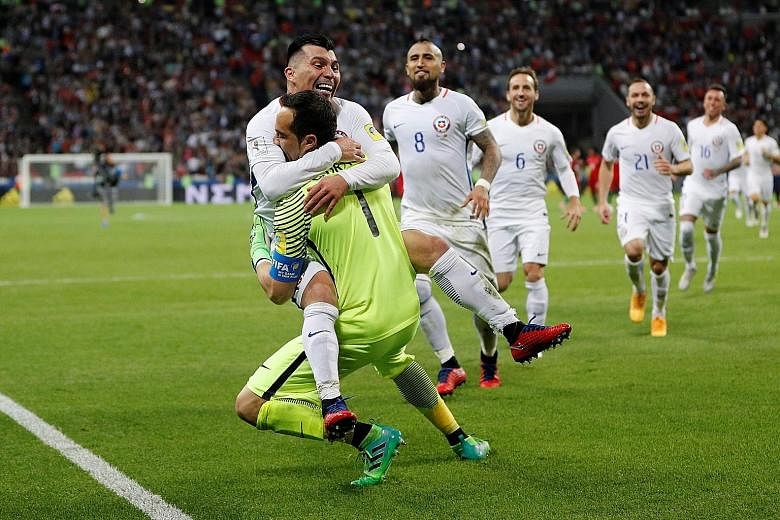ST PETERSBURG (Russia) • They were thought as lightweights even in their own continent at the start of this decade.
In a mere seven years, however, Chile have transformed themselves into a tough-as-nails national football side, equally capable of stylish attacking as well as obdurate defending.
Already, they are two-time Copa America champions (2015 and 2016), after going 99 years without winning the South American continental title.
Now, on the eve of their first Confederations Cup final, their prized midfielder Arturo Vidal is eyeing the ultimate prize - next year's World Cup.
"We have proven our value, we have beaten Argentina and Portugal, the European champions," he said. "If we win (the Confederations Cup final), we will prove we are the best team in the world.
"We have reached this final with our spirit and attitude - this is a waiting room for the World Cup - and if we win, that will show where we are.
"We still have to qualify for the World Cup, but we have a lot of energy and want to prove ourselves."
Symbolically, Chile will take on world champions Germany in today's final in St Petersburg, with the teams having drawn 1-1 in the group stage. Alexis Sanchez's early strike for Chile was cancelled out by Lars Stindl when the teams met in Kazan 10 days ago.
Having knocked Euro 2016 winners Portugal out of the Confederations Cup in Wednesday's semi-final, Vidal says beating Germany's young guns will solidify their World Cup credentials.
"This team never gives up, which means we can achieve great things," Chile captain Claudio Bravo said after his side eliminated Portugal 3-0 in Kazan.
"We are from a country that might not be used to these kind of situations. So, by playing football, we have the chance to make our people happy so they can forget about their problems. That's the most beautiful thing of all."
How did Chile manage this transformation into an international football powerhouse? The answer, ironically, is by staying the same.
Having come together impressively under Marcelo Bielsa at the 2010 World Cup and scaled the heights with his successor Jorge Sampaoli at the helm, this Chile side have a long-established and close-knit understanding almost unheard of at international level.
Togetherness akin to a club team and a common sense of purpose are easy to spot, and these are expected to stand them in good stead in next few years, when their top players are still in their prime.
Employing a high-pressing strategy, Chile rely on the dynamism of Vidal and the invention of Sanchez to lead the attack.
And they do not have possession, the whole team defend from the front, pressuring opponents all over the pitch to try and regain the initiative.
If somehow their opponents manage to elude their high-pressing, veteran defenders Gary Medel and Gonzalo Jara are on hand to marshal a steady defence.
When all else fails, there is always the penalty-saving brilliants of Bravo to rely upon.
It was their overall consistency that allowed them to become South American champions ahead of traditional powerhouses Brazil and Argentina.
Even at the 2014 World Cup, they were unlucky to lose out to hosts Brazil on penalties in the last 16 after beating defending champions Spain 2-0 in the group stage.
The subsequent back-to-back Copa America titles were achieved with roughly the same squad, ensuring it is a group that can draw on the invaluable experience of achieving success on the big stage.
Several players also ply their trade in top European leagues. Bravo and Sanchez play regularly in England's Premier League, while Vidal has lifted the German Bundesliga trophy twice in as many seasons with Bayern Munich.
After spells at Bayer Leverkusen and Juventus, Vidal replaced Bastian Schweinsteiger at Bayern and has developed into one of the world's best midfielders, crucially calming his sometimes volatile temper in Bavaria.
According to Fifa.com analyst Diego Zandrino, Chile are peaking - mentally and tactically - at the right time, even though their profligacy in front of goal and their energy reserves may prove to be an issue in today's final.
Already there are indications from the Bravo household that the latest generation of Chile supporters are becoming more than a little accustomed to success.
"I have four kids at home and if I come back with empty hands the youngest would get angry and demand for results," Bravo said of his unlikely harshest critic.
"We earned this ourselves. That's beautiful and hopefully that will remain the same in the future.
"We hope to keep bringing joy to our fans and now we face an important step, so we'll aim for the desired result and we'll make sure we are consistent in order to achieve it."
Germany coach Joachim Low is well aware of Chile's strengths.
"Chile are the strongest opponents in this tournament, we know them pretty well and we expect them to go for it in the final," he said. "They will be trying flat out to pull it off, as they are coming to the end of their season, and we will have to try and counter that."
AGENCE FRANCE-PRESSE, REUTERS
SEE ALSO Heart of Football: Big movers Everton can shake up top four

